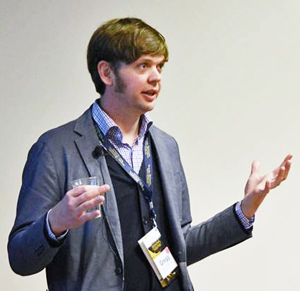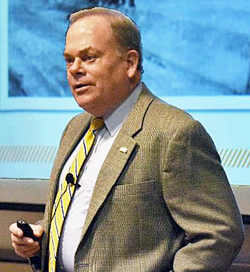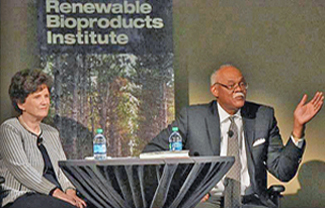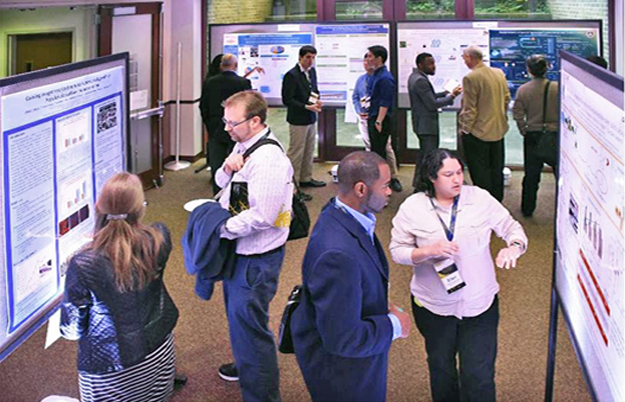Renewable Bioproducts Institute Executive Conference Highlights Technology Advancements, Possibilities

Industry research leaders and guests in record-breaking numbers visited the Renewable Bioproducts Institute at Georgia Tech (Atlanta, Ga., USA) this week to meet with faculty, students, government agency, and association affiliates at the annual Executive Conference. This year’s event, Reimagining Bioproducts Industries: New Ideas—New Opportunities, featured advancements and possibilities in manufacturing processes and products from renewable forest-based raw materials.
The three-track conference offered faculty and student presentations on Operational Excellence in Advanced Pulping, Paper, and Packaging; the Future of Biocomposites and Nanocellulose; and New Opportunities in Biochemicals. In addition to the keynote, the conference included 20 faculty speakers, 12 external speakers, 6 student speakers, and several panel discussions—one, a nanocellulose users group. A total of 42 graduate student researchers supported by the RBI endowment exhibited posters of their work.
Gregg Beckham, Ph.D. (photo upper right), a senior researcher with the National Renewable Energy Laboratory, led off with a keynote address on strategic approaches to biorefining processes. "NREL’s approach," he said, "is to innovate and create technologies to make the bioeconomy happen." Beckham also spoke at the Biochemicals track on Lignin Valorization by Biological Funneling and Chemical Catalysis.

Georgia Tech EVP-Research Steve Cross (photo left) cited a dozen companies with an established presence on campus, and urged pulp and paper companies to join them. "We call it the Bump Factor," he commented. "When companies run into each other at Tech Square, opportunities happen." Cross also cited the history of innovation and industry collaboration of RBI and its predecessor Institutes, dating back to 1929, as a "legacy never to be lost."
James Dallas, author of Mastering the Challenges of Leading Change and formerly on the executive leadership teams of Georgia-Pacific and Medtronic, was the featured dinner speaker. He urged research leaders to speak the language of business, to become a business partner in addition to being technical experts, and develop skill at reading the culture of the organization in leading change. "If you stick to what you’ve always done, you’ll be stuck by what you’ve always done," he noted wryly.
RBI executive director Norman Marsolan noted a higher level of company/faculty interaction than ever before, with many topics identified for follow-up. "At this conference, we welcomed many members back to RBI, as well as many new guests," he observed. "We are eager to take advantage of these connections to further our collaborations and create new opportunities."
The Renewable Bioproducts Institute, formerly the Institute of Paper Science and Technology, is an Industrial Research Center of Georgia Tech that delivers innovation in converting biomass into value-added products, developing advanced chemical and bio-based refining technologies, and advancing excellence in manufacturing processes.
In the photo on the right, author James Dallas chats with Kathleen Bennett of RBI at the April 5 dinner.
In the photo below, 42 graduate researchers presented their work at a poster session.
TAPPI
http://www.tappi.org/
 Industry research leaders and guests in record-breaking numbers visited the Renewable Bioproducts Institute at Georgia Tech (Atlanta, Ga., USA) this week to meet with faculty, students, government agency, and association affiliates at the annual Executive Conference. This year’s event, Reimagining Bioproducts Industries: New Ideas—New Opportunities, featured advancements and possibilities in manufacturing processes and products from renewable forest-based raw materials.
Industry research leaders and guests in record-breaking numbers visited the Renewable Bioproducts Institute at Georgia Tech (Atlanta, Ga., USA) this week to meet with faculty, students, government agency, and association affiliates at the annual Executive Conference. This year’s event, Reimagining Bioproducts Industries: New Ideas—New Opportunities, featured advancements and possibilities in manufacturing processes and products from renewable forest-based raw materials. Georgia Tech EVP-Research Steve Cross (photo left) cited a dozen companies with an established presence on campus, and urged pulp and paper companies to join them. "We call it the Bump Factor," he commented. "When companies run into each other at Tech Square, opportunities happen." Cross also cited the history of innovation and industry collaboration of RBI and its predecessor Institutes, dating back to 1929, as a "legacy never to be lost."
Georgia Tech EVP-Research Steve Cross (photo left) cited a dozen companies with an established presence on campus, and urged pulp and paper companies to join them. "We call it the Bump Factor," he commented. "When companies run into each other at Tech Square, opportunities happen." Cross also cited the history of innovation and industry collaboration of RBI and its predecessor Institutes, dating back to 1929, as a "legacy never to be lost." The presentations will be posted on the
The presentations will be posted on the 